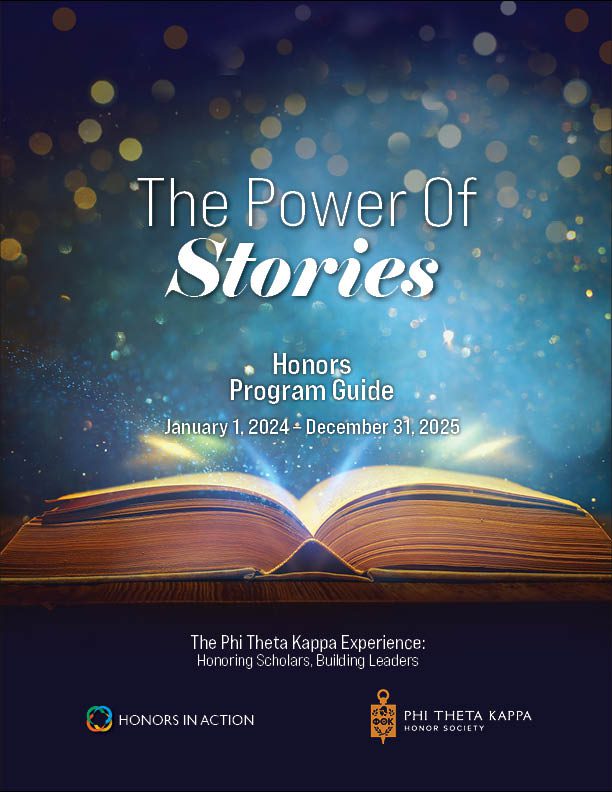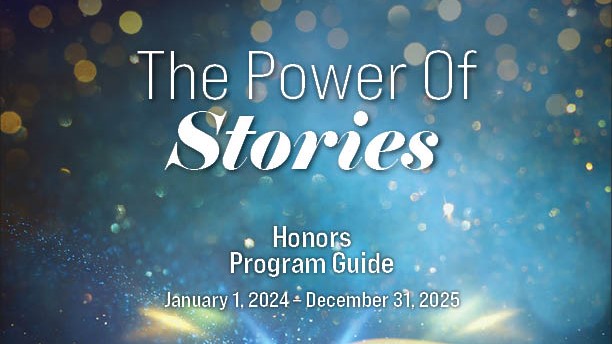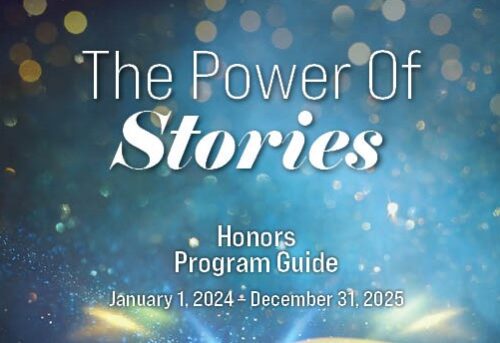Dr. Susan Edwards, Senior Director of Honors Programs

The Honors Study Topic is one of the many things that helps the society stand out from others, and it is time to introduce the 2024/2025 Honors Study Topic. Members of the Honors Program Council worked for the past two years to develop the topic and create the new Honors Program Guide. The council used eight criteria to select the topic. It had to be interdisciplinary, international, interesting, intellectual, important, in the news, theme-oriented, and action-oriented. Using these criteria, they developed a fascinating topic for the next two years, “The Power of Stories” that will serve as the cornerstone of chapters’ Honors in Action Projects.
The 2024/2025 Honors Study Topic has eight themes that serve as lenses to explore “The Power of Stories.” Each theme has an overarching question. These questions are important to your team’s investigation because if your research question and conclusions can answer the overarching question in some way, you are using the correct theme for your Honors Study Topic investigation. If not, check the other themes and overarching questions to see if one fits your team’s interests better.
There is something for everyone in “The Power of Stories.” Here are the eight Honors Study Topic themes and overarching questions:
Theme 1: Why We Tell Stories
Overarching Question: Why are stories essential to the human experience?
Theme 2: Perspectives Shape Stories
Overarching Question: In what ways do perspectives shape stories people share?
Theme 3: Ways Stories Are Told
Overarching Question: What means do people use to tell stories, and why?
Theme 4: Preserving Stories
Overarching Question: What factors inform or influence the preservation of stories?
Theme 5: Representation Through Stories
Overarching Question: How do untold, silenced, suppressed, or stolen stories impact society, and why does representation of these stories matter?
Theme 6: Stories of Persistence, Resilience, Healing, and Sorrow
Overarching Question: To what extent do stories of persistence, resilience, healing, or loss provoke and inspire?
Theme 7: Stories as Information, Misinformation, and Disinformation
Overarching Question: How do stories serve as avenues of information, misinformation, or disinformation?
Theme 8: Fables, Folklore, and Fairytales
Overarching Question: In what ways do messages shared through fables, folklore, and fairytales influence and reflect culture?
Let’s briefly look at the themes. For longer introductions to each theme, check out pages 12-27 in the 2024/2025 Honors Program Guide. Stories have been essential to the human experience. People have used stories to explain the universe and why things happen the way they do. They have used stories to shape and convey cultural traditions and norms. Lisa Cron, author of Wired for Story, argued, “Story, it turns out, was crucial to our evolution – more so than opposable thumbs. Opposable thumbs let us hang on; story told us what to hang on to.” There is something special about getting lost in a story and taking on the characters’ perspectives. Researchers at Yale University found that people who read fiction for 30 minutes a day increase longevity by as much as 23%.
Perspectives, of course, shape stories. The judges on the television show “The Voice” tell stories about why contestants should choose to join their teams. During awards season, artists, managers, movie studios, publicists, and media share stories in varied formats about who they believe should win awards and why to reach voters.
Stories can be told and preserved in many ways. Misty Copeland tells stories through dance. Women of Gee’s Bend in Alabama tell stories through quilts. Vern Yip tells stories through design. Joel Sartore tells the stories of animals and insects through photographs. Taylor Swift tells the story of her career so far through her Eras Tour and documentary. Masai women and men use body modification to tell their stories. Some Alaska Native groups use totems. Greta Gerwig tells stories using film. Museums preserve art and artifacts created by people to convey their stories. Though Plato perhaps invented the tale of Atlantis, it has endured through explorers who search for the lost colony and share their stories.
It is important to tell and preserve stories that have been untold, silenced, suppressed, or stolen. Author Chimamanda Ngozi Adichie has noted that many stories matter: “Stories have been used to dispossess and to malign. But stories can also be used to empower and humanize. Stories can break the dignity of a people. But stories can also repair that broken dignity.” This includes stories of persistence, resilience, healing, and sorrow that can provoke and inspire us.
Stories can serve as avenues of information, misinformation, and disinformation. How can we know the difference? Central Washington University created a website to spot misinformation and disinformation in news stories.
Fables, folklore, and fairytales offer messages that influence and reflect culture worldwide. Poet and playwright W.B. Yeats collected and published Irish folklore and fairytales and wrote that stories reflect “birth, love, pain, and death.” Stories of all kinds tell us who we are as people and societies. They pass down cultural knowledge and traditions. They belong to our collective memory. They serve as sources of life and inspiration. That’s “The Power of Stories.”




